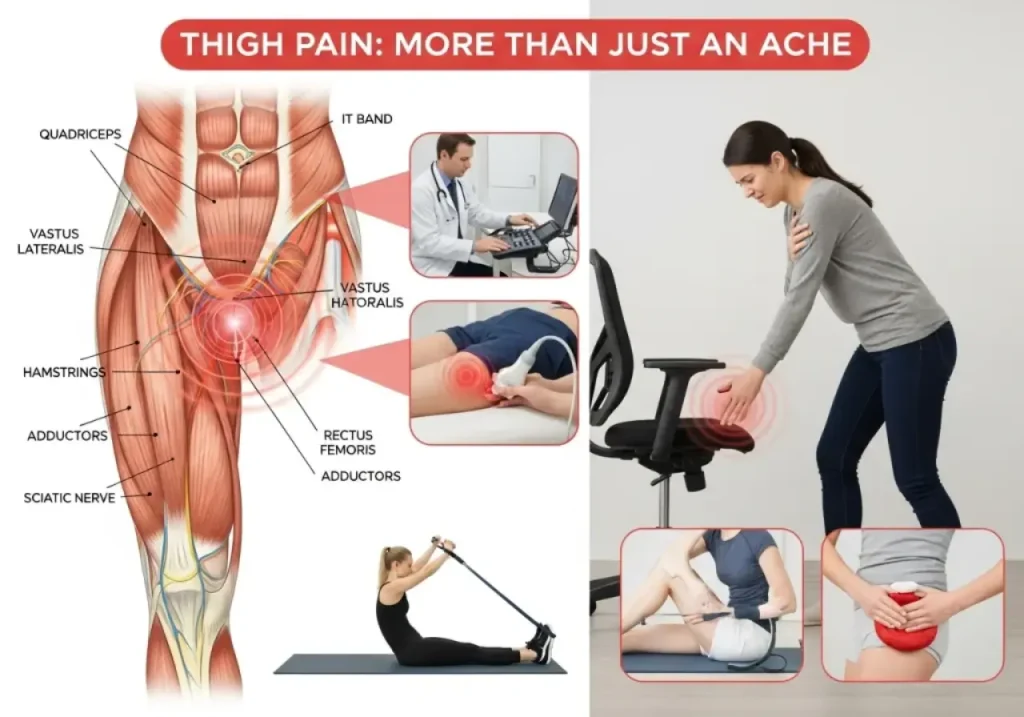Thigh pain can start as a dull ache after a long walk or a sharp twinge when you stand up. It’s easy to dismiss it as a simple muscle strain, but when it persists, it can have a detrimental effect on your mobility as well as activities of daily living. The first step is to begin with understanding its impact fully and then working towards managing the root cause to get back the quality of life you deserve.
The Challenge to Daily Movement
Some of the body’s most powerful and largest muscles which are essential for the smooth movement are located in the thigh. On getting pain in this area, even the simplest action starts to get difficult. Something as simple as climbing the stairs or getting in and out of the car can become quite an effort. The after-effect is significant limitation on the movement which forces an individual to become less active resulting in a cycle of deconditioning with muscle becoming weak and tight. This causes the worsening of the pain and further reluctance to move.
The Ripple Effect on Your Quality of Life
The effects of persistent thigh pain has far reaching effects that ripple out impacting nearly every aspect of living. Persistent pain often leads to muscle guarding, reduced mobility, and compensation patterns that may affect other joints such as the lower back, hips, or knees. Overtime, fatigue starts to build up which results in loss of independence and increased reliance on the family and friends for simple tasks. As chronic pain is exhausting, the build-up frustration and emotional distress disrupts sleep, increases irritability leads to reluctance to socialise causing isolation.
Your Questions Answered
What are the most common causes of thigh pain?
The origin of thigh pain can be from various sources which includes muscular strain, nerve compression or dysfunction in the hip and knee joint which can result in the referred pain to the thigh. It is important to understand the source of thigh pain. Understanding the source of the pain is critical, as effective treatment depends on identifying the underlying cause—whether muscular, neurological, or joint-related.
When should I see a professional?
It is advisable to take professional help if pain persists even after few days of rest, or is accompanied by symptoms like numbness, swelling, warmth, redness or difficulty in mobilising. Pain radiating from the lower back or buttocks or limits your ability to move the hip or knee joints indicate either nerve compression of dysfunction in the joints. Inability to weight bear on the leg or pain resulting from significant injury can result warrants immediate attention. Timely assessment is the key to identification of the cause and guide the relevant treatment options. Physiotherapists are skilled at assessment of the thigh pain identifying the cause by using various tests and developing treatment plans using personalised approach.
How can home physiotherapy help?
Home Physiotherapy offers a practical and highly effective alternative to those individuals whose mobility is limited by thigh pain. The Physiotherapist eliminates the stress and discomfort of travelling to the clinic by coming directly to your doorstep. It also allows the Physiotherapist to assess you in your own environment, identifying the challenges like negotiating stairs, transferring out of your arm-chair or mobilising in the house. This allows the therapist to develop a personalised rehabilitation plan aimed at regaining movement, independence and quality of life. This also improves adherence to treatment and confidence building.
Why choose UKhomephysio for home physiotherapy?
At Ukhomephysio, we specialise in providing assessment and treatment by expert Physiotherapists in the comfort of your own home. We have a team of highly experienced Physiotherapists who are skilled at developing treatment plans focussed at meeting your needs and wishes. Whether the thigh pain is muscular or neurological in origin, we are at your service to help you get back to doing things that matter the most to you !
Taking the First Step
Don’t let thigh pain dictate your life. By seeking right help, you can address the underlying cause and manage the symptoms effectively. The right Physiotherapy input can put you on the path to recovery by accelerating healing, reducing pain thus, regaining the lost independence. Please contact Ukhomephysio to schedule home physiotherapy session and begin the journey towards recovery from thigh pain. You can contact us by calling 02080873132 or fill the webform by clicking Make An Enquiry and we will get back to you.

